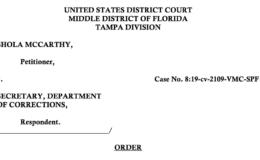Trump v. Vance: Initial Breakdown of the November 2, 2019 Second Circuit Opinion re: Production of Tax Returns
- By : Cbh
- Category : law & order, Trump

The Second Circuit issued its opinion this morning in Donald J. Trump v. Cyrus Vance, Jr. in his capacity as District Attorney of the County of New York and Mazars USA, LLP.
You can find the 34-page opinion here.
The following is an initial, rough outline of the court’s opinion.
HOLDING:
“…presidential immunity does not bar the enforcement of a state grand jury subpoena directing a third party to produce non‐privileged material, even when the subject matter under investigation pertains to the President.”
Stated later as: “we hold only that presidential immunity does not bar a state grand jury from issuing a subpoena in aid of its investigation of potential crimes committed by persons within its jurisdiction, even if that investigation may in some way implicate the President.”
Also: “There is no obvious reason why a state could not begin to investigate a President during his term and, with the information secured during that search, ultimately determine to prosecute him after he leaves office.”
LAW:
- “The president of the United States may be subpoenaed, and examined as a witness, and required to produce any paper in his possession” US v. Burr (1807); Clinton v. Jones (1997).
- “presidents have been ordered to give deposition testimony or provide materials in response to subpoenas” Clinton v Jones
- “the exercise of jurisdiction [over the President] has been held warranted” when necessary “to vindicate the public interest in an ongoing criminal prosecution.” Nixon v. Fitzgerald (1974)
- “a generalized claim of the public interest in confidentiality of nonmilitary and nondiplomatic discussions” was insufficient to justify non‐compliance with a subpoena “requiring the production of materials for use in a criminal prosecution.” Id.
- “[The President] concedes that he, like every other citizen, is under a legal duty to produce relevant, non‐privileged evidence when called upon to do so.” Nixon v. Sirica (1973)
ANALYSIS:
- “Here, none of the materials sought by the Mazars subpoena implicates executive privilege.” Citing Cheney v. US Dist. Ct. for DC (2004)
- “Nor does the subpoena seek information regarding the President’s ‘action[s] taken in an official capacity.’” Clinton v Jones (1997)
- “The subpoena at issue is directed not to the President, but to his accountants; compliance does not require the President to do anything at all.”
- “[Relative to the Supremacy Clause] no court has ordered the President to do or produce anything.”
- “… the President [has not] explained why any burden or distraction the third‐party subpoena causes would rise to the level of interfering with his duty to faithfully execute the laws…”
- “the fact that Nixon was ordered to comply with a subpoena seeking documents for a trial proceeding on an indictment that named him as a conspirator strongly suggests that the mere specter of “stigma” or “opprobrium” from association with a criminal case is not a sufficient reason to enjoin a subpoena”
- “it would nonetheless exact a heavy toll on our criminal justice system to prohibit a state from even investigating potential crimes committed by him for potential later prosecution, or by other persons, not protected by any immunity, simply because the proof of those alleged crimes involves the President”
Comments? Issues? Drop me an email.
Image credit: Flickr Mike Licht


